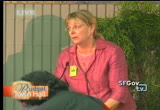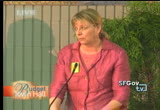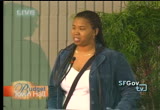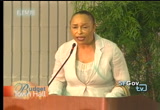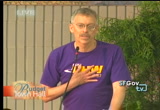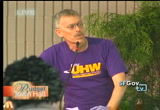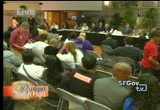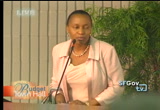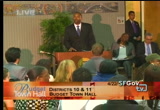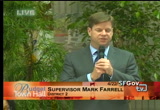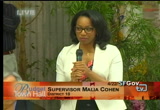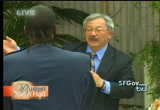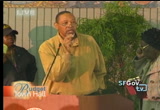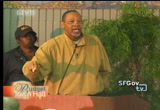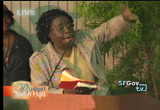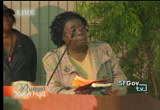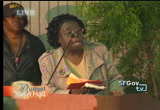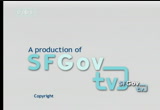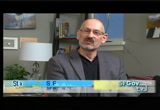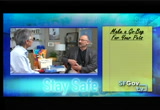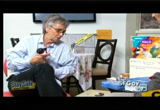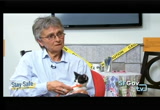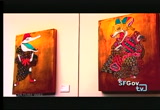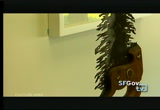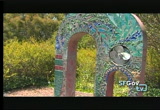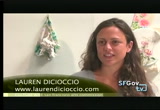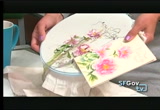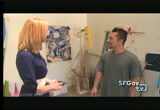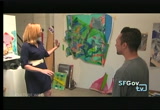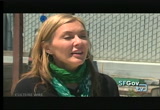tv [untitled] April 22, 2013 7:30pm-8:00pm PDT
7:30 pm
we need more support services to help people and to help people a app apply. a lot of people don't know where to find housing or where to start. we are trying to focus on that with seniors. and i want to talk about senior exit center, that looks out for ex-offenders. those are the people coming back, relatives and sons and daughters and uncles and aunts that are out of jail and prison and need a place to stay. and we can't find them a place to stay. we can get them transitional housing for three month and then nothing. and lastly i want to talk about the adult center, that serves a lot of vulnerable people. i want to thank the mayor who
7:31 pm
helped out last year, and we still need that program. and i want to have a staff member tell why she works there. >> good evening, i am christina martin, i work at the bayview health center. i worked there three years, i went through the job now program and became permanent. i graduated from this school, cff as i work there. cathy works hard to save our jobs. she's been doing that since i started working there. we lost $80,000 of funding this year, and keep losing more. and when we went to managed care we lost funds as seniors don't understand and get confused. please save our center and keep supporting, thank you.
7:32 pm
>> carol tatem. >> good evening everybody. i have all the concerns that have been expressed here this evening. but i didn't come to talk about concerns. i came to make accommodations. i have lived in district 10 for 43 years. and i have been in more pot holes than i have years and life. but most recently in district 10, towards the end of san bruno avenue, near manzle. there has been a tremendous street improvement. and i want to say thank you for that. because i have ruined some tires running into pot holes.
7:33 pm
and someone talked about mcclaren park and the need for improvement of services up there. i wish mayor lee, that you would take the drive up manzle, you probably wouldn't go back. because the street is dangerous. so i want to say again thank you to mohamed (inaudible) and under your direction and the department of public works and the improvements you have made to the streets of san francisco most recently. >> good evening, mayor, supervisors, department heads. we have had a number of members that had to go, i am bradley weedmyer, i am from the home care unit workers. could our members still here wave to the celebrities here up
7:34 pm
front. thank you. we are here because we provide care for seniors and disabled in a needy community. we are facing state-wide cut this summer, july 1. we need help from the city. we are asking that with the new funding process that has come down, san francisco's budgeted this much for this portion of the ihss program. a new maintenance of effort is below that. and that's what the city now has to send for its part of federal, state and city-county money. we ask that difference go towards our members in an hourly raise. and also that won't completely cover the cut. perhaps we can go into the general fund. and let me point out, one the best reasons for doing that is because the lower waged workers
7:35 pm
spend the money in san francisco. spend in district 10 and district 11 and across our city. it's the best recycling of the money. you know these crazy austerity people are coming back at us, put this money back in the town. help our home-care workers help keep our seniors and disabled at home and happy and serviced. and while we are doing that, let's spread some money around and make sure that our economy is thriving in our districts. thank you. >> hi, good evening, mayor lee and cohen and supervisors and
7:36 pm
department heads and residents of bayview. i am janet, i have a couple of issues i would like to encourage you to consider. i recently met with steve kawa and mayor lee and john templeton about the development of african-american tourism. and mr. templeton submitted a proposal to provide a way to tap into those funds. and to also bring employment into this area. and to also give value to the lives and the residents of the people that are here. and also again provide a source of employment. the other thing that i would like to encourage you to do is
7:37 pm
as we have these huge development programs in the area. that are geared towards certain percentage of employment in hiring residents. that you also include professional services such as accounting and legal and real estate sales. and thank you for stretching the dollar as much as you have been able to. i know it's tough. we are counting on you to continue to do the good work you already have been doing. thank you. >> before we hear from supervisor farrell. i want to remind everyone in the audience, if you didn't get an opportunity to speak tonight. you definitely have an opportunity to speak with the supervisors. you have an opportunity to talk to other department heads at different times. continue, continue to advocate for your communities. and we apologize if you don't get the opportunity to speak tonight. now we will have the budget
7:38 pm
hearing process statements from supervisor farrell. >> thank you for hearing your comments tonight. it's great to hear from the community. and sorry if not everyone got a chance to speak tonight. wanted to give you a quick time frame in terms of the budget process and city hall. over the next two months we will have different departments and finance committee, it's open to the public. you are welcome to attend the the mayor and the staff will present the budget to the board of supervisors in early june. and we will review for a month. and we will hold hearings in city hall, again open to the public. and we aim to present to the board of supervisors and have it signed by middle of the year.
7:39 pm
please come and let your voices be heard. and thank you again for all of your comments tonight. thank you. >> and now we will hear from supervisor cohen and supervisor avalos and mayor lee. >> all right, i know there are some people in the audience that still want an opportunity to speak. i want to let you know, i will speak on behalf for you mr. avalos. but it's an opportunity that we welcome everyone that wants to meet with us, can come and talk to us about the budget. i want to appreciate everyone that came out. everyone that came out, it's important to be a part of this conversation. that's about it. there you go. >> thank you for being here, i
7:40 pm
will stay longer, we have to get home kids have homework. but i will stay longer. our process as a city needs to reflect the great needs we have here in district 10 and 11. and one thing we have is lots of senior and young people. and we have higher levels of poverty in this district. that our city needs to respond to. something that i am committed to work on and hear from more you on how i can be supportive. thank you. >> rather than listen to me, i will yield my time to you. please go up there now and give us your two minutes, okay. i got these two in front of me. let them finish. go ahead. >> my name is robert woods. i have been working in this community since 1972.
7:41 pm
working with avallo when he was mayor of san francisco. when i worked in the community, i saw the community working and making money. and not on their knees like they are now. and for anybody to be less than human, and you don't recognize that. the community is crippled and they need help. they need help. they don't need no promises, they need help. and i say to you that i didn't just get off the tomato truck today. this is something that we have been dealing with for a long time. and for you to come here and to deny us a chance to speak to this group. i am sorry that -- i do not like being ignored.
7:42 pm
especially when the community need help. and i say to you, whatever this community needs, give it to them. because number one i come out here every day and i teach a ged math class for adu. i ain't making no money. but i tell you what, it's something that i know that the community needs. we got six people who passed the ged test and no one really expected us to have that many people. so i come here every day to put in my time. because i look for the community that need my help. i am an architect by education. i spent time in the neighborhood. i director of housing for the city of atlanta empowerment
7:43 pm
agency. i been around. i been around. so i do not like what i see when i drive down third street. it don't make me feel good. if any of y'all drive third street and feel good? i say this is not the place for you. thank you. >> i want to thank you mayor. you know this is my community. espinola jackson, dr. espinola jackson's community. and when i raise my hand for them to pick up if one wants to have something to say. i had my hand in the air first, i don't know how i got behind. i ran behind for the speakers, they don't know the services we
7:44 pm
have in this building here in this community college. we have second language here, and no one should be ignored. everything was talked about except aids prevalent here in bayview hunter's point. we want to see a change in that and also in education, transportation. we have turk out in this community. our young people cannot go to school unless they are jumped upon. this needs to be stopped. and only you can stop this, and help our young people get an education each across town. someone spoke about the transportation. i want to say this, when that third street rail was built. they didn't finish it. they started it. it was supposed to go all the way to city college, but it didn't go there.
7:45 pm
mr. mayor, i want to say this to you, and i be finished because i can talk to you later ----okay, i will take you with me. i want you to stop using the te term war-time housing, there is no war-time housing in san francisco. they were all torn down in 1954 when the integration law was passed where we blacks can live next door to white folks. the public housing, san francisco redevelopment agency, they became public housing after 1954 for black folks. thank you very much, you need to know, and i want to give you the history of my community. because i have been here 70 years. thank you. >> all right, first of all those
7:46 pm
who spoke and sat through this and all the departments and elected officials. i want to thank everyone. it's been an intense night. we got a lot of feedback and a lot of viewpoints. we have to continue working hard. we will be doing our best. and please again feel welcome to give us your input and keep working with us. that's the most important thing of these town hall meetings, we need your input and we will do our best. and keep working with us. thank you very much. good night.
7:47 pm
>> i'm warren corn field and we are doing a series called stay safe, we are going to talk about staying in your home after an earthquake and taking care of your pet's needs. ♪ >> here we are at the spur urban ken center and we are in this little house that was built to show what it is like in san francisco after an earthquake. we are very pleased to have with us today, pat brown from
7:48 pm
the department of animal care and control and her friend oreo. >> hi. >> lauren. >> could you tell us what it would take after an earthquake or some other emergency when you are in your home and maybe no power or water for a little while. what it would take for you and oreo to be comfortable and safe at home. >> just as you would prepare for your own needs should an earthquake or a disaster event occur, you need to prepare for your pets. and i have brought with me today, some of the things that i have put in my disaster kit to prepare for my animal's needs to make sure that i am ready should something happen and i need to shelter at home. >> what are some of the things that people should have in their home after an earthquake or other emergency to help take care of their tasks and take care of themselves. >> i took the liberty of bringing you some examples.
7:49 pm
it includes a first aid kit for your pet and you can also use it for yourself and extra meds for your pets. and water container that will not tip over. we have got both food, wet food and dry food for your pet. and disposable food container. and water, and your vet records. in addition, we have a collar and some toys. >> yeah. to keep oreo busy. >> he needs toys and this is san francisco being a fruity city and come on oreo. this is your dinner, it is patte style chicken dinner with our foody seen here. >> what they say now is that you should have at least a gallon of water and i think that a gallon of water is small amount, i think that maybe more like two gallons of water would be good for you and your pet.
7:50 pm
>> does the city of animal control or any other agency help you with your pet after an emergency. >> there is a coalition of ngos, non-governmental organizations led by the department of animal care and control to do disaster planning for pets and that includes the san francisco spca. the paws group, the vet sos, pets unlimited. and we all have gotten together and have been getting together for over four or five years now to talk about how we can educate the public about being prepared for a disaster as it involves your pets. >> a lot of services. i understand that if you have to leave your home, we are encouraging people to take their pets with them. >> absolutely. we think that that is a lesson that we concerned from karina, if you are being evacuated you should take your pet with you. i have a carrier, and you need
7:51 pm
to have a carrier that you can fit your pet in comfortably and you need to take your pet with you when you were evacuated. >> i am going to thank you very much for joining us and bringing oreo today. and i am goi >> welcome to "culturewire." today we are at recology. they are celebrate 20 years of one of the most incredibly unique artist residency programs. we are here to learn more from one of the resident artists. welcome to the show, deborah. tell us how this program began 20 years ago. >> the program began 20 years
7:52 pm
ago. our founder was an environmentalist and an activist and an artist in the 1970's. she started these street sweeping campaigns in the city. she started with kids. they had an exhibition at city hall. city officials heard about her efforts and they invited her to this facility. we thought it would coincide with our efforts to get folks to recycle, it is a great educational tool. since then, we have had 95 professional artists come through. >> how has the program changed over the years? how has the program -- what can the public has an artist engage with? >> for the most part, we worked with metal and wood, what you would expect from a program like ours. over the years, we tried to include artists and all types of mediums.
7:53 pm
conceptual artists, at installation, photographers, videographers. >> that has really expanded the program out. it is becoming so dynamic right now with your vision of interesting artists in gauging here. why would an artist when to come here? >> mainly, access to the materials. we also give them a lot of support. when they start, it is an empty studio. they go out to the public area and -- we call it the big store. they go out shopping, take the materials that, and get to work. it is kind of like a reprieve, so they can really focus on their body of work. >> when you are talking about recology, do you have the only sculpture garden at the top? >> it is based on work that was done many years ago in new york. it is the only kind of
7:54 pm
structured, artist program. weit is beautiful. a lot of the plants you see were pulled out of the garbage, and we use our compost to transplant them. the pathway is lined with rubble from the earthquake from the freeways we tour about 5000 people a year to our facility, adults and children. we talk about recycling and conservation. they can meet the artists. >> fantastic. let's go meet some of your current artists. here we are with lauren. can you tell us how long have been here so far and what you're working on? >> we started our residency on june 1, so we came into the studio then and spent most of the first couple weeks just digging around in the trash. i am continuing my body of work,
7:55 pm
kind of making these hand- embroidered objects from our day-to-day life. >> can you describe some of the things you have been making here? this is amazing. >> i think i started a lot of my work about the qualities of light is in the weight. i have been thinking a lot about things floating through the air. it is also very windy down here. there is a piece of sheet music up there that i have embroidered third. there is a pamphlet about hearing dea -- nearing death. this is a dead rabbit. this is what i am working on now. this is a greeting card that i found, making it embroidered. it is for a very special friend. >> while we were looking at this, i glanced down and this is amazing, and it is on top of a book, it is ridiculous and
7:56 pm
amazing. >> i am interested in the serendipity of these still life compositions. when he got to the garbage and to see the arrangement of objects that is completely spontaneous. it is probably one of the least thought of compositions. people are getting rid of this stuff. it holds no real value to them, because they're disposing of it. >> we're here in another recology studio with abel. what attracted you to apply for this special program? >> who would not want to come to the dump? but is the first question. for me, being in a situation that you're not comfortable in has always been the best. >> what materials were you immediately attracted to when you started and so what was available here? >> there are a lot of books. that is one of the thing that hits me the most. books are good for understanding, language, and art
7:57 pm
in general. also being a graphic designer, going straight to the magazines and seeing all this printed material being discarded has also been part of my work. of course, always wood or any kind of plastic form or anything like that. >> job mr. some of the pieces you have made while you have been here. -- taught me through some of the pieces you have made while you have been here. >> the first thing that attracted me to this was the printed surface. it was actually a poster. it was a silk screen watercolor, about 8 feet long. in terms of the flatwork, i work with a lot of cloddish. so being able to cut into it come at into it, removed parts, it is part of the process of negotiating the final form. >> how do you jump from the two dimensional work that you create to the three-dimensional? maybe going back from the 3f to
7:58 pm
2d. >> everything is in the process of becoming. things are never said or settled. the sculptures are being made while i am doing the collages, and vice versa. it becomes a part of something else. there's always this figuring out of where things belong or where they could parapets something else. at the end goal is to possibly see one of these collage plans be built out and create a structure that reflects back into the flat work. >> thank you so much for allowing "culturewire" to visit this amazing facility and to learn more about the artists in residence program. is there anything you like our viewers to know? >> we have art exhibitions every four months, and a win by the public to come out. everybody is welcome to come out. we have food. sometimes we have gains and bands. it is great time. from june to september, we
7:59 pm
accept applications from bay area artists. we encouraged artists from all mediums to apply. we want as many artists from the bay area out here so they can have the same experience. >> how many artists to do your host here? >> 6 artist a year, and we receive about 108 applications. very competitive. >> but everyone should be encouraged to apply. thank you again for hosting us. >> thank you for including us in "culturewire." ♪ >> chair adams: time is now 2:08 p.m. in the meeting is being called to order. we would like to thank sf gov tv and san francisco media hall for their continued support for th
68 Views
IN COLLECTIONS
SFGTV: San Francisco Government Television Television Archive
Television Archive  Television Archive News Search Service
Television Archive News Search Service 
Uploaded by TV Archive on

 Live Music Archive
Live Music Archive Librivox Free Audio
Librivox Free Audio Metropolitan Museum
Metropolitan Museum Cleveland Museum of Art
Cleveland Museum of Art Internet Arcade
Internet Arcade Console Living Room
Console Living Room Books to Borrow
Books to Borrow Open Library
Open Library TV News
TV News Understanding 9/11
Understanding 9/11